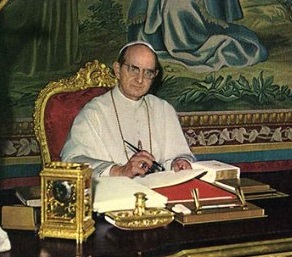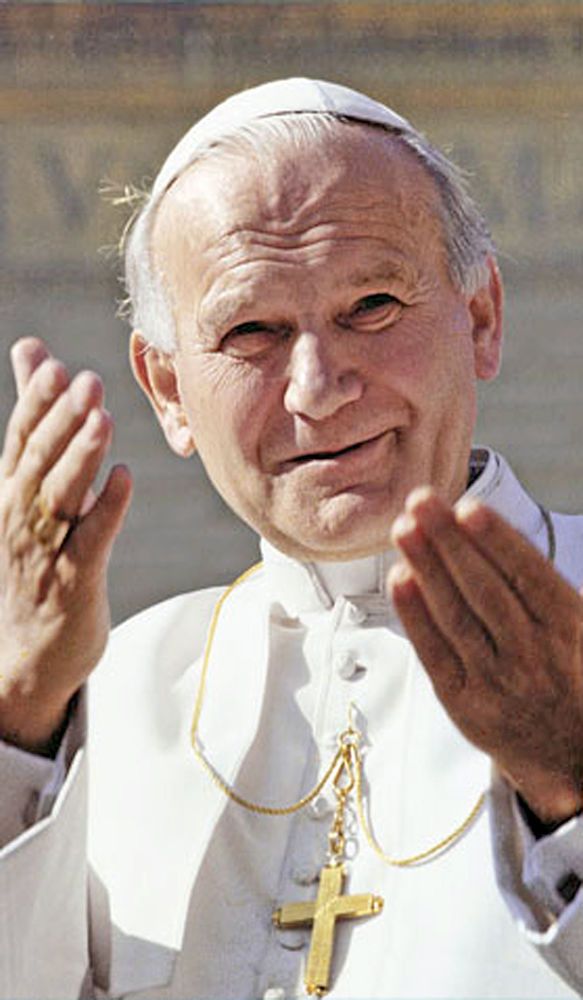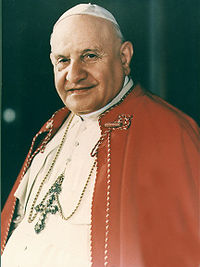John XXIII, Pacem in terris (1963)
2. Peace on Earth – which man throughout the ages has so longed for and sought after –can never be established, never guaranteed, except by the diligent observance of the divinely established order. That a marvelous order predominates in the world of living beings and in the forces of nature, is the plain lesson which the progress of modern research and the discoveries of technology teach us. And it is part of the greatness of man that he can appreciate that order, and devise the means for harnessing those forces for his own benefit.
3. But what emerges first and foremost from the progress of scientific knowledge and the inventions of technology is the infinite greatness of God Himself, who created both man and the universe. Yes; out of nothing He made all things, and filled them with the fullness of His own wisdom and goodness. Hence, these are the words the holy psalmist used in praise of God: “O Lord, our Lord: how admirable is thy name in the whole earth!” [Ps 8:1] And elsewhere he says: "How great are thy works, O Lord! Thou hast made all things in wisdom." [Ps 103:4]
Moreover, God created man “in His own image and likeness,” [Gen 1:26] endowed him with intelligence and freedom, and made him lord of creation. All this the psalmist proclaims when he says: “Thou hast made him a little less than the angels: thou hast crowned him with glory and honor, and hast set him over the works of thy hands. Thou hast subjected all things under his feet.” [Ps 8:5-6]
147. And yet, if they are to imbue civilization with right ideals and Christian principles, it is not enough for Our sons to be illumined by the heavenly light of faith and to be fired with enthusiasm for a cause; they must involve themselves in the work of these institutions, and strive to influence them effectively from within.
148. But in a culture and civilization like our own, which is so remarkable for its scientific knowledge and its technical discoveries, clearly no one can insinuate himself into public life unless he be scientifically competent, technically capable, and skilled in the practice of his own profession.
See the full English text, Pacem in terris
 Vatican Council II, Lumen gentium (1964)
Vatican Council II, Lumen gentium (1964)
36.The faithful, therefore, must learn the deepest meaning and the value of all creation, as well as its role in the harmonious praise of God. They must assist each other to live holier lives even in their daily occupations. In this way the world may be permeated by the spirit of Christ and it may more effectively fulfill its purpose in justice, charity and peace. The laity have the principal role in the overall fulfillment of this duty. Therefore, by their competence in secular training and by their activity, elevated from within by the grace of Christ, let them vigorously contribute their effort, so that created goods may be perfected by human labor, technical skill and civic culture for the benefit of all men according to the design of the Creator and the light of His Word. May the goods of this world be more equitably distributed among all men, and may they in their own way be conducive to universal progress in human and Christian freedom. In this manner, through the members of the Church, will Christ progressively illumine the whole of human society with His saving light.
See the full English text, Lumen gentium
Vatican Council II, Gaudium et spes (1965)
33. Through his labors and his native endowments man has ceaselessly striven to better his life. Today, however, especially with the help of science and technology, he has extended his mastery over nearly the whole of nature and continues to do so. Thanks to increased opportunities for many kinds of social contact among nations, the human family is gradually recognizing that it comprises a single world community and is making itself so. Hence many benefits once looked for, especially from heavenly powers, man has now enterprisingly procured for himself.
In the face of these immense efforts which already preoccupy the whole human race, men agitate numerous questions among themselves. What is the meaning and value of this feverish activity? How should all these things be used? To the achievement of what goal are the strivings of individuals and societies heading? The Church guards the heritage of God's word and draws from it moral and religious principles without always having at hand the solution to particular problems. As such she desires to add the light of revealed truth to mankind's store of experience, so that the path which humanity has taken in recent times will not be a dark one.
34. To believers, this point is settled: considered in itself, this human activity accords with God's will. For man, created to God's image, received a mandate to subject to himself the earth and all it contains, and to govern the world with justice and holiness; [cf. Gen1:26-27; 9:3; Wis 9:3] a mandate to relate himself and the totality of things to Him Who was to be acknowledged as the Lord and Creator of all. Thus, by the subjection of all things to man, the name of God would be wonderful in all the earth. [cf. Ps. 8:7 and 10].
This mandate concerns the whole of everyday activity as well. For while providing the substance of life for themselves and their families, men and women are performing their activities in a way which appropriately benefits society. They can justly consider that by their labor they are unfolding the Creator's work, consulting the advantages of their brother men, and are contributing by their personal industry to the realization in history of the divine plan.
Thus, far from thinking that works produced by man's own talent and energy are in opposition to God's power, and that the rational creature exists as a kind of rival to the Creator, Christians are convinced that the triumphs of the human race are a sign of God's grace and the flowering of His own mysterious design. For the greater man's power becomes, the farther his individual and community responsibility extends. Hence it is clear that men are not deterred by the Christian message from building up the world, or impelled to neglect the welfare of their fellows, but that they are rather more stringently bound to do these very things.[4]
35. Human activity, to be sure, takes its significance from its relationship to man. Just as it proceeds from man, so it is ordered toward man. For when a man works he not only alters things and society, he develops himself as well. He learns much, he cultivates his resources, he goes outside of himself and beyond himself. Rightly understood this kind of growth is of greater value than any external riches which can be garnered. A man is more precious for what he is than for what he has. Similarly, all that men do to obtain greater justice, wider brotherhood, a more humane disposition of social relationships has greater worth than technical advances. For these advances can supply the material for human progress, but of themselves alone they can never actually bring it about.
Hence, the norm of human activity is this: that in accord with the divine plan and will, it harmonize with the genuine good of the human race, and that it allow men as individuals and as members of society to pursue their total vocation and fulfill it.
39. Therefore, while we are warned that it profits a man nothing if he gain the whole world and lose himself, [cf. Luke 9:25] the expectation of a new earth must not weaken but rather stimulate our concern for cultivating this one. For here grows the body of a new human family, a body which even now is able to give some kind of foreshadowing of the new age.
Hence, while earthly progress must be carefully distinguished from the growth of Christ's kingdom, to the extent that the former can contribute to the better ordering of human society, it is of vital concern to the Kingdom of God.
For after we have obeyed the Lord, and in His Spirit nurtured on earth the values of human dignity, brotherhood and freedom, and indeed all the good fruits of our nature and enterprise, we will find them again, but freed of stain, burnished and transfigured, when Christ hands over to the Father: “a kingdom eternal and universal, a kingdom of truth and life, of holiness and grace, of justice, love and peace.” [Preface of the Feast of Christ the King] On this earth that Kingdom is already present in mystery. When the Lord returns it will be brought into full flower.
57. Christians, on pilgrimage toward the heavenly city, should seek and think of these things which are above. [cf. Col. 3:2] This duty in no way decreases, rather it increases, the importance of their obligation to work with all men in the building of a more human world. Indeed, the mystery of the Christian faith furnishes them with an excellent stimulant and aid to fulfill this duty more courageously and especially to uncover the full meaning of this activity, one which gives to human culture its eminent place in the integral vocation of man.
When man develops the earth by the work of his hands or with the aid of technology, in order that it might bear fruit and become a dwelling worthy of the whole human family and when he consciously takes part in the life of social groups, he carries out the design of God manifested at the beginning of time, that he should subdue the earth, perfect creation and develop himself. At the same time he obeys the commandment of Christ that he place himself at the service of his brethren.
Furthermore, when man gives himself to the various disciplines of philosophy, history and of mathematical and natural science, and when he cultivates the arts, he can do very much to elevate the human family to a more sublime understanding of truth, goodness, and beauty, and to the formation of considered opinions which have universal value. Thus mankind may be more clearly enlightened by that marvelous Wisdom which was with God from all eternity, composing all things with him, rejoicing in the earth, delighting in the sons of men. [cf. Prov. 8:30-31]
In this way, the human spirit, being less subjected to material things, can be more easily drawn to the worship and contemplation of the Creator. Moreover, by the impulse of grace, he is disposed to acknowledge the Word of God, Who before He became flesh in order to save all and to sum up all in Himself was already "in the world" as "the true light which enlightens every man" [John 1:9-10].
64. Today more than ever before attention is rightly given to the increase of the production of agricultural and industrial goods and of the rendering of services, for the purpose of making provision for the growth of population and of satisfying the increasing desires of the human race. Therefore, technical progress, an inventive spirit, an eagerness to create and to expand enterprises, the application of methods of production, and the strenuous efforts of all who engage in production – in a word, all the elements making for such development – must be promoted. The fundamental finality of this production is not the mere increase of products nor profit or control but rather the service of man, and indeed of the whole man with regard for the full range of his material needs and the demands of his intellectual, moral, spiritual, and religious life; this applies to every man whatsoever and to every group of men, of every race and of every part of the world. Consequently, economic activity is to be carried on according to its own methods and laws within the limits of the moral order," so that God's plan for mankind may be realized.[cf. Matt. 16:26, Luke 16:1-31, Col. 3:17]
See the full English text, Gaudium et spes
 Paul VI, Populorum Progressio (1967)
Paul VI, Populorum Progressio (1967)
14. The development We speak of here cannot be restricted to economic growth alone. To be authentic, it must be well rounded; it must foster the development of each man and of the whole man. As an eminent specialist on this question has rightly said: “We cannot allow economics to be separated from human realities, nor development from the civilization in which it takes place. What counts for us is man – each individual man, each human group, and humanity as a whole.”' [Cf. L. J. Lebret, O.P., Dynamique concrète du développement Paris: Economie et Humanisme, Les editions ouvrierès (1961), 28]
35. We can even say that economic growth is dependent on social progress, the goal to which it aspires; and that basic education is the first objective for any nation seeking to develop itself. Lack of education is as serious as lack of food; the illiterate is a starved spirit. When someone learns how to read and write, he is equipped to do a job and to shoulder a profession, to develop self-confidence and realize that he can progress along with others. As We said in Our message to the UNESCO meeting at Teheran, literacy is the "first and most basic tool for personal enrichment and social integration; and it is society's most valuable tool for furthering development and economic progress." [L'Osservatore Romano, September 11, 1965]
We also rejoice at the good work accomplished in this field by private initiative, by the public authorities, and by international organizations. These are the primary agents of development, because they enable man to act for himself.
See the full English text, Populorum progressio
 John Paul II, Redemptor hominis (1979)
John Paul II, Redemptor hominis (1979)
15. The development of technology and the development of contemporary civilization, which is marked by the ascendancy of technology, demand a proportional development of morals and ethics. For the present, this last development seems unfortunately to be always left behind. Accordingly, in spite of the marvel of this progress, in which it is difficult not to see also authentic signs of man's greatness, signs that in their creative seeds were revealed to us in the pages of the Book of Genesis, as early as where it describes man's creation, this progress cannot fail to give rise to disquiet on many counts. The first reason for disquiet concerns the essential and fundamental question: Does this progress, which has man for its author and promoter, make human life on earth "more human" in every aspect of that life? Does it make it more "worthy of man"? There can be no doubt that in various aspects it does. But the question keeps coming back with regard to what is most essential -whether in the context of this progress man, as man, is becoming truly better, that is to say more mature spiritually, more aware of the dignity of his humanity, more responsible, more open to others, especially the neediest and the weakest, and readier to give and to aid all.
This question must be put by Christians, precisely because Jesus Christ has made them so universally sensitive about the problem of man. The same question must be asked by all men, especially those belonging to the social groups that are dedicating themselves actively to development and progress today. As we observe and take part in these processes we cannot let ourselves be taken over merely by euphoria or be carried away by one-sided enthusiasm for our conquests, but we must all ask ourselves, with absolute honesty, objectivity and a sense of moral responsibility, the essential questions concerning man's situation today and in the future. Do all the conquests attained until now and those projected for the future for technology accord with man's moral and spiritual progress? In this context is man, as man, developing and progressing or is he regressing and being degraded in his humanity? In men and "in man's world", which in itself is a world of moral good and evil, does good prevail over evil? In men and among men is there a growth of social love, of respect for the rights of others-for every man, nation and people-or on the contrary is there an increase of various degrees of selfishness, exaggerated nationalism instead of authentic love of country, and also the propensity to dominate others beyond the limits of one's legitimate rights and merits and the propensity to exploit the whole of material progress and that in the technology of production for the exclusive purpose of dominating others or of favouring this or that imperialism?
These are the essential questions that the Church is bound to ask herself, since they are being asked with greater or less explicitness by the thousands of millions of people now living in the world. The subject of development and progress is on everybody's lips and appears in the columns of all the newspapers and other publications in all the languages of the modern world. Let us not forget however that this subject contains not only affirmations and certainties but also questions and points of anguished disquiet. The latter are no less important than the former. They fit in with the dialectical nature of human knowledge and even more with the fundamental need for solicitude by man for man, for his humanity, and for the future of people on earth. Inspired by eschatological faith, the Church considers an essential, unbreakably united element of her mission this solicitude for man, for his humanity, for the future of men on earth and therefore also for the course set for the whole of development and progress. She finds the principle of this solicitude in Jesus Christ himself, as the Gospels witness. This is why she wishes to make it grow continually through her relationship with Christ, reading man's situation in the modern world in accordance with the most important signs of our time.
See the full English text, Redemptor hominis
John Paul II, Laborem Exercens (1981)
5. The development of industry and of the various sectors connected with it, even the most modern electronics technology, especially in the fields of miniaturization, communications and telecommunications and so forth, shows how vast is the role of technology, that ally of work that human thought has produced, in the interaction between the subject and object of work (in the widest sense of the word). Understood in this case not as a capacity or aptitude for work, but rather as a whole set of instruments which man uses in his work, technology is undoubtedly man's ally. It facilitates his work, perfects, accelerates and augments it. It leads to an increase in the quantity of things produced by work, and in many cases improves their quality. […]
If the biblical words "subdue the earth" [cf. Gen 1,28] addressed to man from the very beginning are understood in the context of the whole modern age, industrial and post-industrial, then they undoubtedly include also a relationship with technology, with the world of machinery which is the fruit of the work of the human intellect and a historical confirmation of man's dominion over nature.
The recent stage of human history, especially that of certain societies, brings a correct affirmation of technology as a basic coefficient of economic progress; but, at the same time, this affirmation has been accompanied by and continues to be accompanied by the raising of essential questions concerning human work in relationship to its subject, which is man. These questions are particularly charged with content and tension of an ethical and an ethical and social character. They therefore constitute a continual challenge for institutions of many kinds, for States and governments, for systems and international organizations; they also constitute a challenge for the Church.
25. Awareness that man's work is a participation in God's activity ought to permeate, as the Council teaches, even “the most ordinary everyday activities. For, while providing the substance of life for themselves and their families, men and women are performing their activities in a way which appropriately benefits society. They can justly consider that by their labour they are unfolding the Creator's work, consulting the advantages of their brothers and sisters, and contributing by their personal industry to the realization in history of the divine plan” [Gaudium et Spes, 34].
This Christian spirituality of work should be a heritage shared by all. Especially in the modern age, the spirituality of work should show the maturity called for by the tensions and restlessness of mind and heart. “Far from thinking that works produced by man's own talent and energy are in opposition to God's power, and that the rational creature exists as a kind of rival to the Creator, Christians are convinced that the triumphs of the human race are a sign of God's greatness and the flowering of his own mysterious design. For the greater man's power becomes, the farther his individual and community responsibility extends. ... People are not deterred by the Christian message from building up the world, or impelled to neglect the welfare of their fellows. They are, rather, more stringently bound to do these very things” [Gaudium et Spes, 34].
See the full English text Laborem exercens
John Paul II, Address to Scientists and Representative of the United Nation University, Hiroshima, February 2, 1981
3. Criticism of science and technology is sometimes so severe that it comes close to condemning science itself. On the contrary, science and technology are a wonderful product of a God-given human creativity, since they have provided us with wonderful possibilities, and we all gratefully benefit from them. But we know that this potential is not a neutral one : it can be used either for man's progress or for his degradation. Like you, I have lived through this period, which I would call the "post-Hiroshima period", and I share your anxieties. And today I feel inspired to say this to you: surely the time has come for our society, and especially for the world of science, to realize that the future of humanity depends, as never before, on our collective moral choices.
 Benedict XVI, Caritas in veritate (2009)
Benedict XVI, Caritas in veritate (2009)
69. The challenge of development today is closely linked to technological progress, with its astounding applications in the field of biology. Technology — it is worth emphasizing — is a profoundly human reality, linked to the autonomy and freedom of man. In technology we express and confirm the hegemony of the spirit over matter. “The human spirit, ‘increasingly free of its bondage to creatures, can be more easily drawn to the worship and contemplation of the Creator'” [Paul VI, Populorum progressio, n. 41]. Technology enables us to exercise dominion over matter, to reduce risks, to save labour, to improve our conditions of life. It touches the heart of the vocation of human labour: in technology, seen as the product of his genius, man recognizes himself and forges his own humanity. Technology is the objective side of human action[cf. John Paul II, Laborem Exercens, 5] whose origin and raison d'etre is found in the subjective element: the worker himself. For this reason, technology is never merely technology. It reveals man and his aspirations towards development, it expresses the inner tension that impels him gradually to overcome material limitations.Technology, in this sense, is a response to God's command to till and to keep the land (cf. Gen 2:15) that he has entrusted to humanity, and it must serve to reinforce the covenant between human beings and the environment, a covenant that should mirror God's creative love.
70. The key to development is a mind capable of thinking in technological terms and grasping the fully human meaning of human activities, within the context of the holistic meaning of the individual's being. Even when we work through satellites or through remote electronic impulses, our actions always remain human, an expression of our responsible freedom. Technology is highly attractive because it draws us out of our physical limitations and broadens our horizon. But human freedom is authentic only when it responds to the fascination of technology with decisions that are the fruit of moral responsibility. Hence the pressing need for formation in an ethically responsible use of technology. Moving beyond the fascination that technology exerts, we must reappropriate the true meaning of freedom, which is not an intoxication with total autonomy, but a response to the call of being, beginning with our own personal being.

